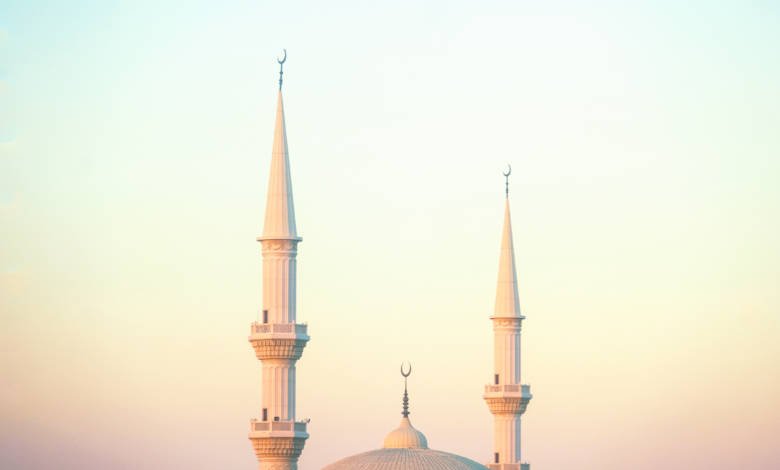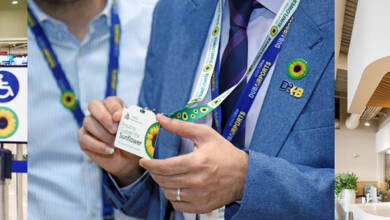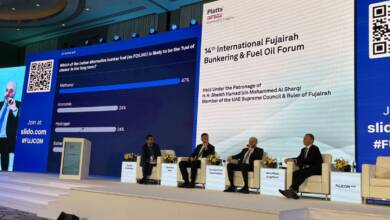Ramadan 2020: Everything you need to know about the holy month in the UAE
Coronavirus will affect many aspects of Ramadan in 2020 - but the essence of the holy month will remain the same

Ramadan is a month when Muslim families and friends come together to share a meal after a long day of fasting and reflect on the blessings they have in their lives.
During the holy month, Muslims become more pious and seek spiritual closeness to God, often reading from the Quran and performing group tarawih prayers at a mosque. They increase their charity and are encouraged to provide meals to those in need.
This year, while many of the Islamic and cultural traditions that Ramadan brings will be affected by the Covid-19 pandemic, some things – when stripped down to their essence – will remain the same.
Here, we review what can be expected from the holy month during this unprecedented time.
What is Ramadan?
Ramadan is the ninth and most holy month of the Islamic (Hijri) calendar. It is believed to be the month that the Quran was revealed to Prophet Mohammed.
During Ramadan, Muslims do not eat or drink between fajr and maghrib prayers (at dawn and sunset).
But Ramadan is not only about abstaining from food, it is also a religious time when people tend to strengthen their faith through recitation of Quran and prayer.
It is also a time for self-reflection when Muslims are no longer preoccupied by many of life’s distractions.
Muslims tend to increase their piety during the final 10 nights of Ramadan. This is because one of these nights, known as Laylat Al Qadr, is believed to be the night the Quran was revealed to the Prophet. It is traditionally celebrated on the 27th night of Ramadan but its exact date is unknown. The rewards for acts of worship carried out on this night are said to be more than the rewards of 1,000 months of worship.
When will Ramadan be?
Ramadan is expected to begin on April 23 this year, according to a member of the Arab Union for Astronomy and Space Sciences. The exact date will be confirmed by the UAE’s moonsighting committee – a group of astronomers, court officials and advisors from the country’s Islamic authority. The committee meets to search for a new crescent moon, indicating the start of Ramadan.
The Islamic calendar is determined by moon phases, which are either 29 or 30 days long. So the presence of a new moon signals the start of a new month in the Islamic calendar.
The committee will begin searching for the new crescent moon after maghrib prayers on the 29th day of Sha’ban, the Islamic month preceding Ramadan. If it cannot be seen, or is known using calculations to not be in the sky, it is considered to be the 30th day of the month.
But if the new crescent is spotted, Ramadan begins the following day. The process is repeated again to mark the end of the holy month and the first day of Shawwal, the 10th month. However, searching for the new crescent can be a little tricky, because it is usually faint and is only seen for about 20 minutes.
What are the obligations for Muslims during Ramadan?
Many of the world’s 1.6 billion Muslims will fast daily. Fasting is obligatory – and one of the five pillars of Islam. Those exempt include young children, anyone who is sick, travellers, women who are pregnant, nursing or menstruating.
This year, those who are experiencing Covid-19 symptoms are expected to be exempt too as this may hamper their recovery.
Muslims tend to eat at iftar and then once again before dawn – this is called suhoor. They must stop eating a few minutes before dawn at a time known as imsak.
During Ramadan, Muslims tend to increase their charity, spend more time with loved ones and strengthen their faith. Some may choose to abstain from listening to music and quit habits like drinking coffee and smoking. This year, families who do not live in the same house will not be able to visit each other, under precautionary measures put in place by the UAE Government to limit gatherings – even at homes.
Some Muslims will also perform Umrah – an optional pilgrimage to Makkah, the birthplace of Prophet Mohammed in Saudi Arabia, that can be done at any time of the year, unlike Hajj which has specific dates. The Kingdom has temporarily banned worshippers from visiting holy sites in Makkah and Medinah to slow the spread of the virus. Similarly, all commercial passenger flights in and out of Saudi Arabia and the UAE have been suspended.
What will happen at mosques?
This year, mosques will be closed for the length of the holy month. This represents one of the biggest changes to Ramadan brought on by coronavirus.
Though many choose to pray at home, Islam encourages Muslims to perform their five daily prayers at mosques.
In Ramadan, an extra extended prayer, held after the evening prayers, is introduced to daily obligations: tarawih.
Ordinarily, mosques would be filled with worshippers, with the faithful sometimes spilling out on to the streets.
Communal acts of worship are believed to bring greater rewards to Muslims but, this year, mosques have been closed and social distancing will require people to pray at home instead.
It is yet unclear if some mosques in the UAE will provide an online prayer service to help worshippers feel connected.
How will Covid-19 affect iftar?
Iftar, which means breaking the fast, occurs once the call for maghrib prayers, at sunset, are heard.
Ordinarily, Muslims break their fast with a glass of water and a date – as Prophet Mohammed did – and then pray maghrib before returning to their meal.
Families typically gather to have iftar together but, this year, anyone not living in the same home will not be able to meet, as part of measures put in place by UAE authorities to stop the spread of the virus.
Mosques in the UAE erect tents or set up outdoor areas where people are given free meals.
Some wealthy families will also set up tents outside their homes, where members of the public can go to have iftar for free. Many low-income workers rely on mosques and these personal tents for meals. This year, charities will deliver food to the homes of people in need instead.
Iftar is marked with the firing of a ceremonial canon as soon as the sun sets. Previously, families would gather in places where cannons are set up – including Sheikh Zayed Grand Mosque and Umm Al Emarat Park – but it is unlikely this will be open to the public this year.
How will Ramadan affect going to the supermarket?
Ramadan tends to be prefaced with a massive food shop, with families stocking up on staples such as rice, yoghurt, meat and even frozen pastries. Vimto, yoghurt drinks and fruit juices are also popular as an Iftar accompaniment and are typically bought in bulk.
This year, worshippers may have to do without some of their annual favourites as shopping trips must be kept to a minimum. While supermarkets have stocked up on food in anticipation of Ramadan, it is likely that some items will sell out due to demand.
As more people turn to online shopping, supermarkets may have to increase their logistical capacity to keep pace. Currently, it can take up to two weeks to receive shopping bought online. This means families may need to be more strategic with their shops, timing them in a way to ensure the essentials do not run out and hungry fasters are left disappointed.
What cultural traditions will be affected by coronavirus?
Iftar and suhoor tents are an annual Ramadan staple. Across the country, hotels set up tents where people can either break their fasts with a lavish buffet or spend the evening, and sometimes early morning. At tents, food and shisha is served as people play cards and board games or watch television.
This year, hotels will not open tents so people will have to either cook iftar daily or order delivery meals. A potential upside to not having large iftar buffets and suhoor tents this year could be reducing food waste, which tends to be an issue during Ramadan each year when hotels make too much food. Some hotels dealt with this by donating left over food to those in need.
TV shows are also a major a source of entertainment throughout Ramadan with families and friends often syncing their choices in programming to review together later.
This year, despite TV shows worldwide being suspended to avoid gatherings, Ramadan programming is expected to run as usual because shows were recorded months ago, prior to the outbreak.
What role might technology play in Ramadan this year?
Worldwide, businesses, government, families and friends have relied heavily on video conferencing to connect with people. Meetings have migrated online and the same is to be expected for many Ramadan traditions.
Families who typically gather for iftar may have to time their Zoom meetings in time for breaking their fast at maghrib.
Those who seek spiritual guidance and typically study the Quran during Ramadan may be able to join webinars organised by mosques and Islamic teaching organisations. Islamic lectures, usually held daily during Ramadan, may also be held online instead.
In the UK, the Ramadan Tent Project, which holds cross-community iftars and events bringing together political leaders and the faithful, will be hosting a virtual iftar through Zoom and streamed live on Facebook instead.
Anyone who signs up for the free event will receive a pack that provides all the tools needed to host an Iftar experience at home, while being a part of a virtual community, every day of Ramadan.
Since no one can travel to Saudi Arabia or visit Makkah, Muslims can use a virtual reality app to have a taste of the experience.
In 2017, digital agency BSocial, launched a virtual reality app called Experience Makkah, which allows users to step inside the holy city. It was the first true virtual reality experience approved by Oculus, the Facebook-owned VR company, in the Middle East.
This Ramadan, the company is gearing up to release version 2.0 of the app, this time on Google Play, and there are plans for an iOS version to follow in Apple’s App Store.
What will stay the same this year?
Despite all the changes that coronavirus and the precautions put in place to prevent its spread, the essence of Ramadan will remain the same.
Increased piety, self-reflection, and focusing on the things in life that matter most will be made easier by having usual distractions eliminated.
The streets have still been decorated with festive and colourful lights – though not many will see them during restricted movement measures. A culture of giving and helping others will likely be further strengthened as people band together in the face of adversity felt globally.
Muslims can continue to fast, taking care to ensure their health is maintained and they stay safe. They can also keep praying, but at home. Quran recitation can be carried out with online resources available to help with pronunciation and explanations.
Muslims can also keep giving to charity and help their communities in whatever way possible. Supporting those in need may be more important this year than ever before with many having had pay cuts or been asked to go on early or unpaid leave.
Since families and friends must spend Ramadan apart, people can be sure to make an effort by calling more or video conferencing to feel closer to each other.
What are the rules – official and cultural – in the UAE?
While many things will change this year, respect and sensitivity for the religious customs associated with Ramadan should not.
Eating and drinking in public places – including in cars that can be seen into – during Ramadan is banned.
Though many people will be working from home this year, essential workers and the 30 per cent of staff allowed in offices must refrain from eating or drinking in front of their fasting colleagues. Typically, workplaces provide a cordoned off area for their non-fasting staff to eat.
Will restaurants be open for Ramadan? Will they still deliver?
Supermarkets, pharmacies and any businesses deemed essential will remain open throughout the day during Ramadan. Restaurants have been closed for dine-in guests but will be able to deliver food all day.
Malls will also remain open, so people can have access to supermarkets, but shops will be closed under coronavirus measures.
Bars, pubs and lounges were closed last month, as were cinemas, public parks and tourist sites, to prevent the spread of the virus. This will likely remain in force for the length of the holy month, if not longer.
Parking is expected to remain free across the Emirates for the duration of the pandemic.
Can people kiss on cheeks or hug their partner or friends of the opposite sex in public during Ramadan?
No one should be touching each other in any way in public under social distancing rules put in place to protect society. As at other times of the year – but especially during Ramadan – people should avoid demonstrative acts of affection in public. This can be an offence.
Do I need to be careful about what I wear during Ramadan?
Men and women are expected to dress more modestly during Ramadan. Revealing and tight clothing should be avoided whenever in public.
Should I refrain from cracking jokes during Ramadan?
Non-Muslims should reconsider using strong language or making jokes that could be deemed inappropriate if Muslims who are fasting are around them.
What happens if I forget it is Ramadan and I accidentally eat or drink in public?
It is unlikely that anyone will be eating or drinking in public because the UAE Government has said anyone who leaves their home must wear a face mask at all times.
In Dubai, this even applies in cars.
What are the working hours during Ramadan?
According to the UAE Labour Law, working hours should be reduced by two hours per day during Ramadan. The law does not differentiate between fasting and non-fasting employees. But working hours will differ depending on whether you work in the private or public sector.




